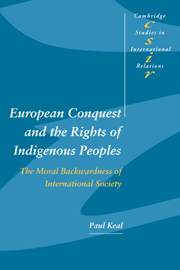 European Conquest and the Rights of Indigenous Peoples
European Conquest and the Rights of Indigenous Peoples Published online by Cambridge University Press: 03 December 2009
The expansion overseas of European peoples as explorers and settlers required them to respond, in some way, to ‘other’ peoples who were both culturally and racially very different from themselves. While there were differences between Europeans themselves, they belonged to an essentially common culture. The diverse peoples they encountered in the Americas, Africa, Asia and the Pacific represented a variety of cultures radically different from their own. Coming into contact with many of these peoples for the first time must have been an extraordinary experience for Europeans; as it would have been for those they encountered. On the part of both Europeans and non-Europeans alike, there were varying degrees of, if not total, incomprehension or lack of mutual understanding of each other. Cultural incommensurabilty, or the absence of a common measure between cultures, was a crucial element in the development of relations between Europeans and non-Europeans. Europeans generally either made no attempt, or else failed, to understand non-Europeans in their own terms. Instead, Europeans typically conceptualised non-Europeans in ways that regarded them as inferior; dehumanised them; and treated them as representing a lower stage of political, social and economic development that Europeans had themselves left behind.
This chapter considers some ways in which non-Europeans were conceptualised by Europeans. Its purpose is neither to write a history nor to present a novel argument but instead to understand some important concepts in the evolution of European thought concerning others.
To save this book to your Kindle, first ensure [email protected] is added to your Approved Personal Document E-mail List under your Personal Document Settings on the Manage Your Content and Devices page of your Amazon account. Then enter the ‘name’ part of your Kindle email address below. Find out more about saving to your Kindle.
Note you can select to save to either the @free.kindle.com or @kindle.com variations. ‘@free.kindle.com’ emails are free but can only be saved to your device when it is connected to wi-fi. ‘@kindle.com’ emails can be delivered even when you are not connected to wi-fi, but note that service fees apply.
Find out more about the Kindle Personal Document Service.
To save content items to your account, please confirm that you agree to abide by our usage policies. If this is the first time you use this feature, you will be asked to authorise Cambridge Core to connect with your account. Find out more about saving content to Dropbox.
To save content items to your account, please confirm that you agree to abide by our usage policies. If this is the first time you use this feature, you will be asked to authorise Cambridge Core to connect with your account. Find out more about saving content to Google Drive.